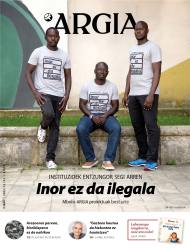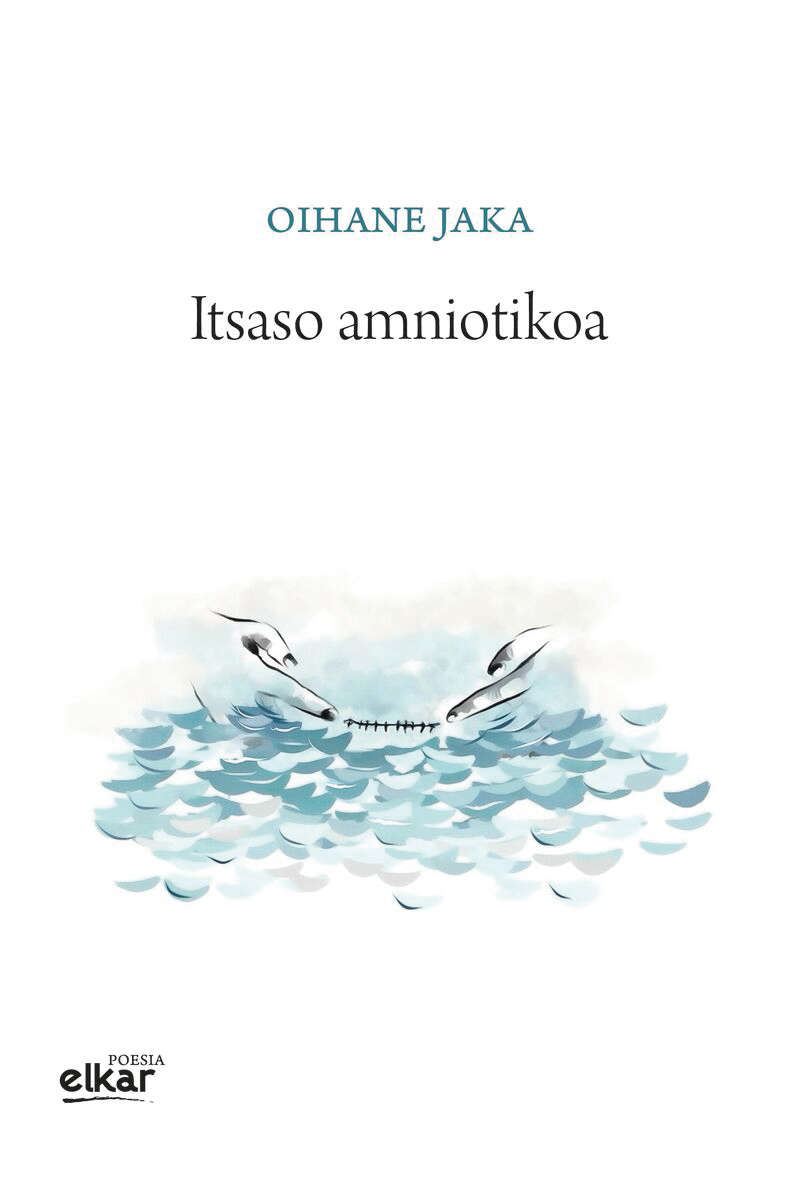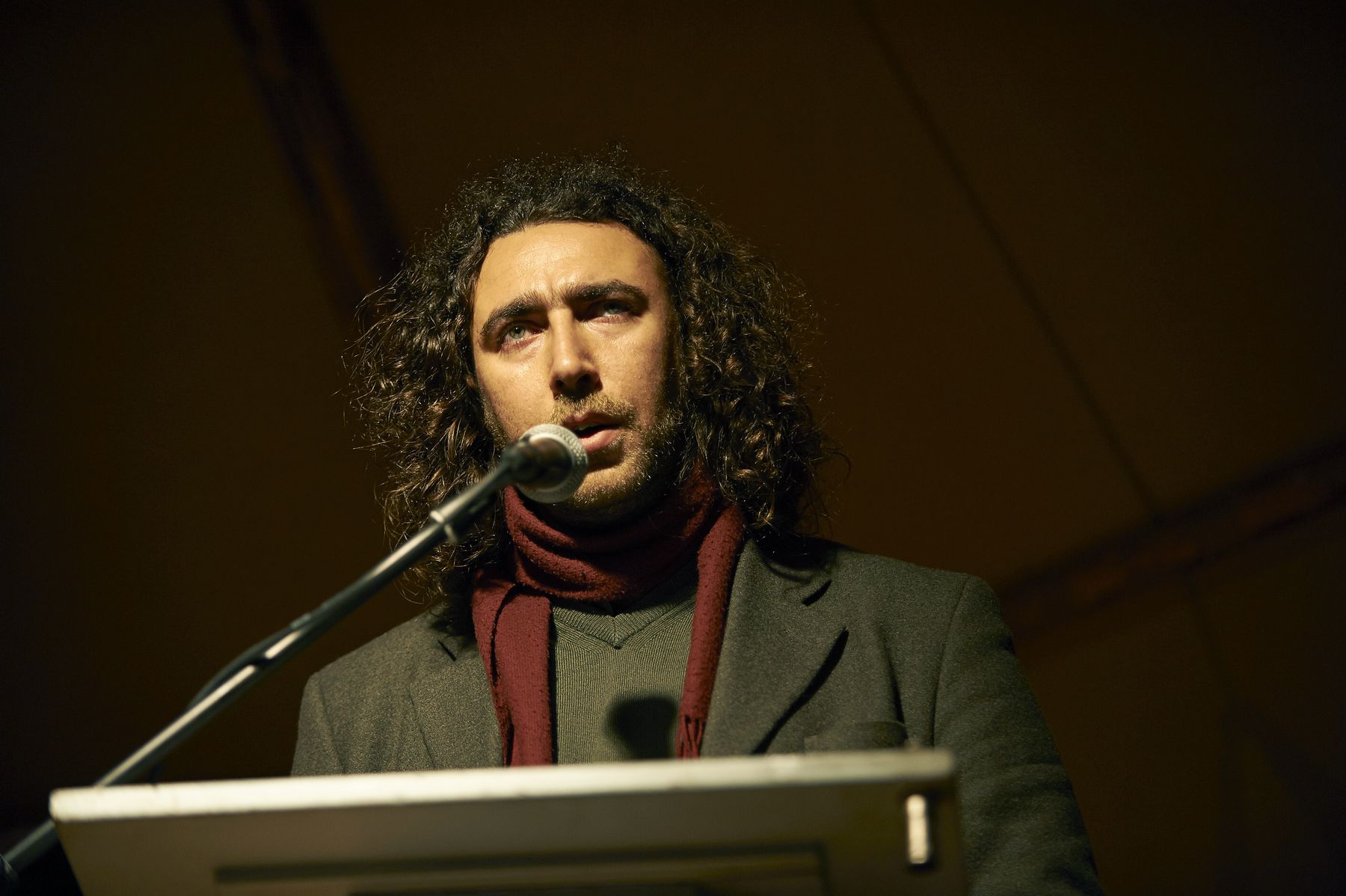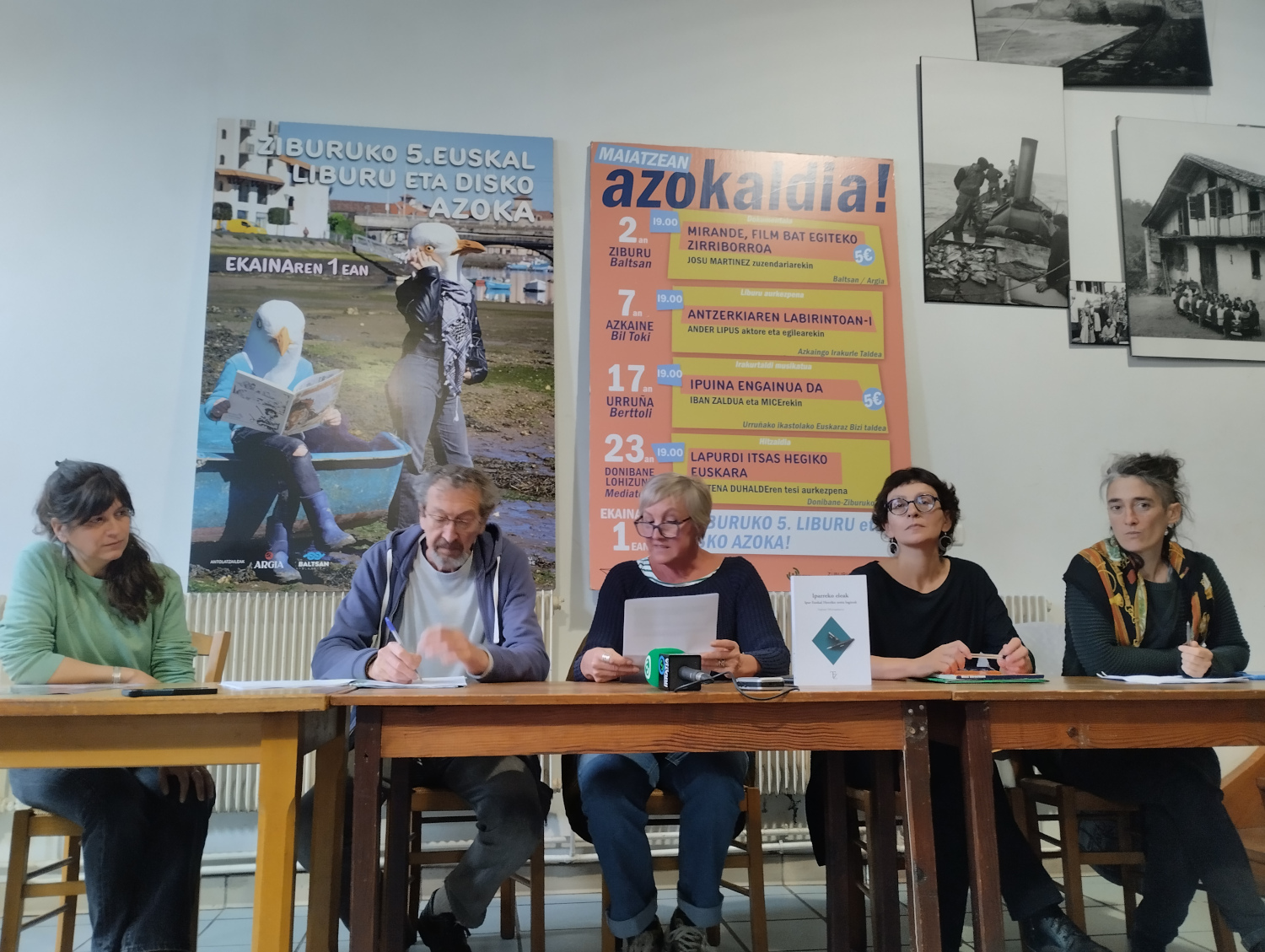"I made my way as I felt, with the aggression I had inside"
- His works in the paths of poetry are known. In one, with their poems; in the other, working for many to see the light. He has been organizing the Days of Breath Poetry in Senpere for 25 years and collecting in his books the poems that are read that day. The contrincant is exposed, looking at the pepper, the reverse.

Auxtin Zamora Durruti. Senpere, 1943
His name is always linked to poetry, the Hatsa association and the Days of Breath Poetry, but here he has gone beyond the paths of the poem. Founded in a farmhouse, he studied in the private school of the town until 1954, in the Church of Baiona in the following two years, and in the Minor Seminary of Ustaritz from 1956 to 1959. He did not hold the seminary to Lyceum René Cassin de Baiona. He worked in Québec in 1967, and back home, married, he started selling donkeys. He was then an accountant at the Young Workers' Residence in Baiona between 1975 and 1998, and since then he was a night watchman at a hotel in San Juan de Luz until his retirement in 2004. It's a poet, a series of raised collections and a common actor. He has paid tribute to the Congress of Writers of Sara and has been appointed honorary member of Euskaltzaindia.
In Senpere, and in the estuary of Senpere, we have the present lake of Auxtin Zamora Durrutik, Herri Urrats, and the college of Seaska Cinco, called Kattalin Elizalde… It is important to see that the new college of
Seaska was born here in Senpere, next to that lake. In my childhood, that place was called: Rainbow. At that time there was no house, or one that was on the margin of the road, as far away. Then everything was a rainforest and a splash of water. There was nothing! I was going in childhood, playing, honored -- and I didn't see nehor, I used.
The artificial lake swallowed the Rainbow of your childhood...
Yes, now it's a tourist site, because everything is house in that area. They changed their names! The French called him Lake Alain Camy. Alain Camy was a boy of my age, young death. This boy's father tore up this lake, and when his son died, they decided to give him the name of the boy, in French, which is obvious. Le lac Alain Camy… There you see how the vasquity has been lost: What was Ortzana, now is Alain Camy.
Has your name been French?
Maybe yes. But when I saw the lake finished, one day something begins, in Basque: Herri Urrats. Herri Urrats was one day long. It was a miracle. And now that I see things changing little by little by the influence of the ikastola, which the new college has emerged there, it is a huge pleasure. That place had lost the Basque soul, and now it is filled with that soul, not whole, but a little more than before, and that is a great hope for him.
As you said your childhood, it will be good that we created you in Senpere in 1943, in the Altziburua house of the Olha district.
That World War II was not thin.
Yes, and here were the Germans, but the war was soon like a storm. There were no fights here, but there was revenge. When the Germans were expelled from France, some were sold and I know that some Germans were killed between Senpere-Sara. Not many, but some, two or three. That has not been mentioned... In my family, I have a story, how an uncle, in resistance, cleaned a German. It was small and then I've known. I also know that there were food cuts as a result of the war, and that my mother brought me and brought me from one side or the other. He protected me well, being my first child.
Most of the eight kids, the boss, at a farmer's house in the Olha neighborhood. There we have raised you...
Yeah, and I studied at local school. In Senpe there were two schools, that of the church, and secular, although at the time when I think that in Senpere all were Catholics, except some foreigners, guards... or gendarmes! The secular school brought together terrible children: outsiders, orphans. These orphans came from Senpere families to have seeds. They weren't very well seen, and families left them in public school. Few children were excluded.
.jpg)
The chance of the desert, throw it everywhere.
But those foreign children were also raped to do the catechism. Here, along with [Larraldea] in Amotz, there was a small school of outsiders and orphans, who were very few, but had that school. However, the priest of the people did not come here, and the children from here went to the village to the kashimi. I remember the cure was bad for them to come late. Sometimes it didn't even let them in, because they had arrived very soon. There was already a battle between secularism and the Catholic Church started in the 19th century, and also in Senpere! These orphaned children, then, traveled the way like others, learned to speak in Basque in their families and, in general, have been well treated in families, although some cases have been bad. You know, the Basques are not like everyone else.
In school everything was going to be in French.
Yes, but we need to talk about this Basque catechism in Senpe. In other places it was not! In Sara, let's say, they did both. In Senpe, the catechism was in Basque, and we read that at least in Basque. We were not literate, I have never been literate, but catechism, and the magazine Herria, we read in euskera.Herria gave written presence to the Basque, although it did not have much influence among people. But nevertheless, it gave presence to our identity. In the church we bought that magazine, apart from the Mass.
"If we in the town spoke Basque, "Petzeroak!" they called the street. They had to prove that they were elites."
What was the prestige of the Basque at that time and in the whole people of the Basque country?Thanks to the
atmosphere of the house we have maintained the Basque. I say, at school I was not French, and on the other hand, what I was told in my head about the Basque, that outside Baiona the Basque was worthless, that French was better taught. And I did. I liked French, language, because that is a fairy, but it is also possible with what ideology the person uses. I realized it much later, and I really cared.
Beyond Bayona, the Basque Country did not serve, a step further from French fast after the Great Gerla of 14, or “those who only drew Euskera, morts pour la patrie”? Of
course. In Senpere it was 60 months in the Great War of 14. In World War II there were also many serious injuries, even deaths... and that affected a lot. Those who did the war came from behind and were proud of the people. And they also imposed their conception, because they had war done. We were humble to the former soldiers, and when they celebrated the War of 14, the people followed the ceremony, which has greatly influenced the French... The celebration of the war continues and the Morts pour la patrie monument is always present next to the church.
The church and the statue, always apart, always by the hand.
Both linked between the church and the statue. For example, at the time of the 14th Gerla, the pastor here was very Germanian, he was a warrior pushing the young, he was a militant. He also wrote two books, the two Piarres, the first and the second, in which his desire is expressed. His name was Jean Barbier. It was a cave, because, when dead soldiers came to the town, at first a family went to practice their sorrow, but then he stopped going: the outlaw went away, but Barbier himself did not appear. He was holy. It has gone into the history of literature in writing, but it has not been well seen here.
Who is interested in this history of literature?
Nehor doesn't, because he doesn't read Lapurdi's literature. There are young people, yes, well learned and experts, interested in our literature, and, in my view, the most surprising thing is that the people do not have the essence of the elite. It is unfortunate: the people are not interested and the elite are. Already in our time there was a difference between the peasants and the worlds of the street. We, the peasants, were petzers, further away from the people and more occupied, closer and less. If in the town we spoke in Euskera, “Petzeroak!” they called the street. They had to prove that they were elites. And the priests did the same: in the cache, which was made in Basque, they did it also in French, in the seminary or outside the school. For them in French.
Nor was the elite Basque in our country.
Now it is the other way round, as it says, the people are not interested, the elite is.
It is now the Basques who have become aware. Like me, with a jib on my head. Those are Basques, and I am glad to see if there are young and expert people who are becoming. By the age of 15-16, I never thought I was going to see it, I couldn't guess it was going to be such a consciousness. Now, seeing that awareness, it makes me happy to see a young man who speaks better than me, who has learned much more than me.
These young experts have studied at university… Yes, and
I always say that I have studied my university studies within the universe, I did not need a university. I need college students, yes, I am interested in the knowledge inside them, but I didn't see any need for me to study college. Well, I guess I would, maybe not many, because I'm not a great boss, but I would.
You made it village to Baiona, at the age of eleven.
I was in Senpere until I was eleven, and then I went to church school in Baionarat, influenced by the priests. They convinced my family that I should be a priest. I wasn't too fond of healing, I didn't want to be a cure. I wanted to be a priest, but to do the Mass ceremony! And then from Baiona to the Typical Seminary of Uztaritz.
"I do not regret not going to Algeria, because I have started the war and I have started the weapons. It would be so simple that all kingdoms had to smoke. "We're not going to make guns!"
In Ustaritz he had Piarres Lafitte among the teachers. Among the students were Manex Pagola, Gexan Alfaro, Pantxoa Carrere, Peio Ospital...
Yes, they all met them. In Gexan-eta, they made a small revolution in favor of the Basque country, as the previous teachers and students referred to French. Little revolution, not generalized, but that served to make people aware… I met Lafitte little, I had six months of teaching. We considered her divine, but when I met her, she did nothing in Basque. I did not see Basque Lafitte there. It's amazing because in the seminary there were two parallel worlds: one hidden, one discovered.
What two worlds? Does Basque speak?
Yes, because everybody knew Basque, all the students I mean. However, everything was French, everyone kept the Basque secret. Some of these students made their way in Basque. Manex Pagola! I remember that Manex Pagola was given before us as a missionary: he stood on the stairs and raised his hands and made a speech in favor of the Basque. I spent a year in Ustaritz, but I left, because I didn't support that seminary atmosphere. And Cassin went to the public high school, Baionarat.
René Cassin [Baiona, 1887 – Paris, 1976] Who knows people?
He contributed to the Universal Declaration of Human Rights… He was not a vasophile.
Who is vasophile today?
Petzero growers… Some. The Basque country has been retained through cultivation, and its children are aware of the Basque country today. Some yes, many no. Few have always been enlightened.
.JPG)
He escaped from being a cure, because he did not support him, he was able to make life outside the Algerian
warrior… But I was a soldier in Amiens, in northern France. Eliminate the young people they wanted from their environment. The North was more French, by the influence of the Gerla of 14, and by the Second World War, and a way for the Basques to enter it was a way for us. And after French, that stays inside. I was not in Algeria as a student: I had a year to go to the army and just after that year Algeria was over. I do not regret not going to Algeria, because I have started the war and I have started the weapons. It would be so simple that all kingdoms had to smoke. “We are not going to make weapons!” You have to work, but not doing weapons!
Speaking more, it surprises me, because I read that in 1967 he went to Québec to make money to get married.
Yes, because I had nothing, and now I have nothing either. Ha, ha… I needed money to get married, and there they also speak French, I left. I wasn't intellectual, and I worked in cocia, in a pension. This is also the case here: immigrants come and start cooking, cleaning dishes. I didn't spend much time in Québec, a year and a half, two years or more, but since I started working, slowly, I looked at work, and in the end my manager asked me to be a chef. I started in the dinnerware, I wanted to hold the chef, but I said no, I had to come home, not concert.
And since then he worked on selling the donkey, on the accountant, on a hotel's night watchman… until he entered the bars. We, on the other hand, have always believed that he was a real poet.
Poetry encouraged me to do all those jobs. I didn't want to stay in a situation. Each situation has a limit, it has a principle and an idea. And when you feel the idea of the situation, you have to do something else. Thus, you maintain your identity, greater freedom. I think that has been the case. I, at least, look at my way. But it's my path, not the path of others. I've done it as I've felt, unconsciously, with the aggression inside.
* * * * * * *
Wars
“War to the death of the enemy does not depend on humanity, it is not what man does from himself. Modern Age has brought it. Before, the people, who had no mushrooms or bombs, fought with stones, clubs or swords, that was the end! Now it is enough to press the button to burst the world! People don't see them, and you throw the bomb away, like that Hiroshima bomb, from the plane. This is still the case today.”
The chance of the migrant
“In the last century, and before, many Basques went to America, someone out there, and I also had a cousin in Québec, and I left because I needed money to get married. I never left the workplace, I didn't pay accommodation, I didn't spend money -- I kept all the money and I came, and I got married."
LAST WORD
Thunder
“Coming from Quebec, I was a co-driver inside of college students. The swallows already talked and I've had their influence. Then came the fugitives, Txillardegi, the Euskara batua… It’s no wonder that inside me came the xymixed, and an atmosphere of thunder, which awakened my consciousness.”
We opened the poems book by Oihana Jaka and found two deals. One father and another son. It is worth noting for its direct relationship with the poems we will find. The book is structured in three parts:
Hamaika urte, Hamaika hilabete eta Hamaika egun. Number eleven is also... [+]
Bildumako azken alea izango dela jakinarazi dute: lehenbizikoa Ni-ari buruzkoa izan zen, eta bigarrena Zu. Bigarren hura bezala, autoedizioan kaleratu du honakoa ere.















